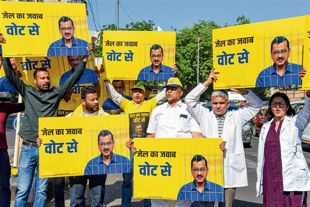
If there is one thing which agitating farmers across regions agree upon, it is the implementation of the MS Swaminathan Commission report, particularly its suggestion to give growers 50 per cent profit over input costs. However, Union minister Harsimrat Kaur Badal has said that it is time to go beyond the Swaminathan report because “we have the MSP of very few crops”. She has not specified what better ideas to improve the state of agriculture or the plight of farmers she has than the top experts who have gone in detail into what ails the agriculture sector and how to cure farm sickness.
The Akali Dal is a key member of the NDA government. Representing an agricultural state, Harsimrat Badal should be exerting pressure on the Modi government to implement, or improve upon, the Swaminathan report. Instead of merely talking, she should be getting things done. She is welcome to extend the MSP cover to left-out crops. Her suggestion to farmers in acute financial distress to adopt new technology is the “eat-cake-if-can’t-afford-bread” kind of advice. Selling the NDA idea of crop insurance makes little sense in a state with 98 per cent assured irrigation.
Harsimrat Badal does not ever shy away from offering her opinion on any issue. Her silence on higher taxation on processed food is, therefore, uncharacteristic, or maybe deliberate. Under the GST, to be introduced on July 1, fruit and vegetable juices will be taxed at 12 per cent, against the current tax rate of 5 per cent. Fruit jams, vegetable purees and frozen aloo tikki will have an 18 per cent tax against the present 5 per cent. Fertilisers too will cost 5-7 per cent more and the tax on pesticides has been raised from 12 to 18 per cent. From zero tax, textiles has come under 5 per cent tax. Experts often suggest promotion of food processing and textiles for increasing returns from agriculture, cutting farm produce waste, creation of jobs and improving the lot of farmers. None of the political parties thriving on peasant votes have raised their voice against the GST blow to farmers.


























